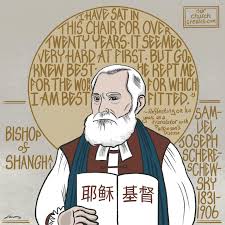Mission, Power and Choice
Reflections on John 20.19-31
RCL Easter 2A
16 April 2023
Holy Trinity Anglican Church
New Westminster BC
In 1859 a recently-ordained deacon embarked from California on board a ship bound for Shanghai. His name was Samuel Isaac Joseph Schereschewsky and he would spend the next forty-seven years of his life as a Christian missionary, bishop, educator and translator in China.
Schereschewsky had already had an incredible journey, geographically and spiritually, before boarding that ship at the age of twenty-eight in 1859. Born in Lithuania in 1831 to parents who were orthodox Jews, Schereschewsky was intended for the rabbinate. But an encounter with a New Testament in Hebrew during his rabbinical studies convinced him that Jesus was the long-promised Messiah. His spiritual journey then led him from his rabbinical college in Ukraine to Germany and then to the United States, from the messianic Jewish movement to the Baptists to the Presbyterians and finally to the Episcopalians.
He eventually became Bishop of Shanghai in 1877 and was instrumental in establishing educational institutions and in translating the Scriptures and liturgical materials into various Chinese dialects. But just four years into his episcopal ministry, Schereschewsky was stricken by a stroke. He resigned as bishop in 1884 and spent the remainder of his life as a translator. By the end of his life he was able to use only two fingers on one hand to type, but he persevered. When asked by a reporter about his struggles and frustrations as a result of the stroke, Schereschewsky said, ‘It was hard at first. But, in the end, God enabled to do the ministry I was suited to do.’
Schereschewsky has always been a favourite modern saint of mine. The bishop who ordained me, Bill Frey, always wanted to name a new parish after him but never did. In Schereschewsky I have found a living example of some ideas I see in today’s familiar gospel reading from John.
It is Easter evening and the Eleven along with other disciples are hiding, afraid of the religious authorities and the Romans, uncertain about the future and confused by the reports that their Lord is not dead. Then Jesus comes into their midst, through the locked doors of the room and of their hearts. In the space of a few moments he transforms them into a community with a purpose: “As the Father has sent me, so I send you.” (John 20.21c NRSVue) They are no longer a community of disciples, that is to say, students or protégés. They are now an apostolic community, ambassadors, agents, the continuing presence of Christ in the world.
It’s not enough, though, to be commissioned, to be called, they, and we, need to know what it is that God would have them, us, do: “(Jesus breathed on them and said to them, ‘Receive the Holy Spirit. If you forgive the sins of any, they are forgiven them; if you retain the sins of any, they are retained.’” (John 20.22a-23)
They, and we, are given power to liberate or to oppress. Throughout the Gospels it is undeniably clear that God in Jesus is at work liberating the creation from all that oppresses us, all that binds us. God frees us form our fear of death; God frees us from our inability to become more fully human in the image of God and the likeness of Christ; God frees us from our selfishness and misuse of the resources God has entrusted to us.
But in giving us the power to heal, God has also given us the power to hurt. It is the divine dilemma: by entrusting to us the power to do what we know God wants us to do, God must take the risk that we will choose to walk in other paths and to ignore the ‘better angels of our nature’.
In Thomas the Eleven and the others face the first test of their commitment to the ministry of Jesus and the power that Christ through the Spirit has breathed upon them. Do they embrace Thomas despite his doubts and sarcastic remarks or do they shun him? They choose to embrace him and, in this sign, this work of God, we are able to “continue to believe that Jesus is the Messiah, the Son of God, and that through believing (we) may have life in his name.” (John 20.31bc)
More than one hundred and twenty-five years ago Samuel Schereschewsky came to believe that Jesus was the promised Messiah and used the power given to him to build bridges between China and North America. His legacy continues in St. John’s College at UBC, founded in 1997 by alumni of the original college in Shanghai, closed by the Communist government in 1951. By the Spirit’s power Schereschewsky moved the two fingers left to him to continue the work of translating the Scriptures, a translation which is still used by Chinese Christians to this day. He accepted the commission and used the Spirit’s power to build up and to heal, even when weakened and limited in his abilities.
Through our baptism, you and I have been incorporated in this ministry of liberation God began in Jesus and continues in and through us. We have been given power to heal or to hurt, to build up or to tear down. The choice always lies before us, just as it did when the Eleven and the others pondered how to solve a problem like Thomas.
Who are our Thomases? From what do they, do we, need liberation? On this Sunday, on every Sunday, on every day, Jesus has come through our locked doors and stands in our midst, waiting to see what we will choose.

1 comment:
Thank you Richard. If one were in church listening to your reflection, only some of it would be digested. Your making this to read allows one to receive it all and consider the vast possibilities you pose. I’m very grateful.
Post a Comment